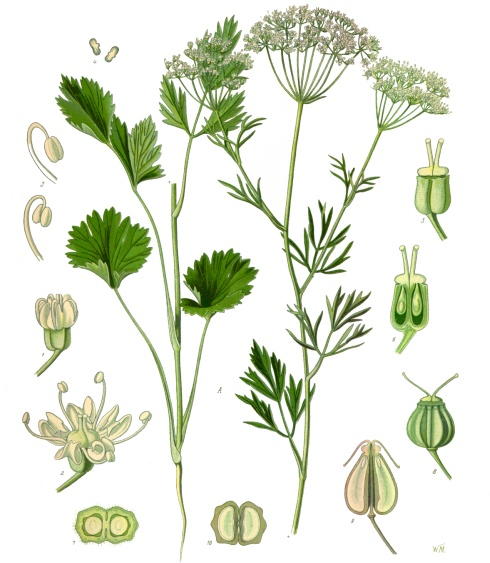Pimpinella anisum (L)
 Synonyms: Anisum vulgare (Gaertn.), A.
officinarum (Moench.), Anise, Anisum, Anisi fructus, common aniseed
Synonyms: Anisum vulgare (Gaertn.), A.
officinarum (Moench.), Anise, Anisum, Anisi fructus, common aniseed
Order: Umbelliferae
Description: Pimpinella is an annual herb cultivated in many countries but indigenous to Turkey, Greece and Egypt. It grows up to 60cm in height and is umbelliferous in appearance with leaves varying in shape from heart-shaped to feathery. The fruits are covered with short hairs and each contains two dark seeds with light ribs.
Parts used: ripe fruits
Collection: The ripe dry fruits should be harvested between July and September.
Constituents: 1.5-4% volatile oil (about 80% antheole), coumarins, glycosides, fixed oils, 30% fatty oils, choline
Actions: Relaxing expectorant, spasmolytic, carminative, antiseptic, parasiticide, aromatic
Indications: Bronchial catarrh, pertussis, spasmodic cough, flatulent colic. Topically for pediculosis and scabies.
Therapeutics and Pharmacology: The volatile oil in aniseed provides the basis for its internal use to ease griping, intestinal colic and flatulence. It also has a marked expectorant and antispasmodic action and may be used in bronchitis, in tracheitis where there is persistent irritable coughing, and to reduce the symptoms of whooping cough. Externally, the oil may be used in an ointment base for the treatment of scabies and lice infestations. Aniseed's mild oestrogenic effects, thought to be due to the presence of diantheole and photoantheole, explain the use of this plant in folk medicine to increase milk secretion, facilitate birth and increase libido.
Combinations: May be combined with Mentha piperata in flatulent colic; with Marrubium, Tussilago, Symplocarpus and Lobelia in bronchitis; and with Prunus in tracheitis. Mix with equal amounts of Foeniculum and Carum for flatulent colic. The oil (1%) may be combined with oil of Sassafras (1%) in an ointment base for scabies.
Caution: Pimpinella and Illicium verum (Chinese star anise) should not be confused with Japanese star anise (Illicium lanceolatum) which is poisonous.
Preparation and Dosage: (thrice daily)
GSL
Dried fruits: 0.5-1g or by infusion
Oil: 0.05-0.2ml
Spirit B.P.C. (1949): 0.3-1ml
Distilled Anise Water B.P.C. (1934) 15-30ml
Additional Comments: In Biblical times, aniseed was used as a tithe and was cultivated by the Egyptians, Greeks and Romans. It is a popular flavouring agent for alcoholic drinks such as Pernod, anisette, ouzo and arak. The seed is often used in confectionery. Star anise (Illicium verum) comes from a tree indigenous to south-east Asia and has similar properties to Pimpinella.
Bibliography
BHMA 1983 British Herbal Pharmacopoeia, BHMA, Bournemouth.
Grieve, M. 1931 A Modern Herbal, (ed. C.F. Leyel 1985), London.
Hoffmann, D. 1990 The New Holistic Herbal, Second Edition, Element, Shaftesbury.
Lust, J. 1990 The Herb Book, Bantam, London.
Mabey, R. (ed.) 1991 The Complete New Herbal, Penguin, London.
Mills, S.Y. 1993 The A-Z of Modern Herbalism, Diamond Books, London.
Ody, P. 1993 The Herb Society's Complete Medicinal Herbal, Dorling Kindersley, London.
Richardson, R. 1988 The Little Spice Book, Piatkus, Loughton.
Weiss, R.F. 1991 Herbal Medicine, Beaconsfield Arcanum, Beaconsfield.
Wren, R.C. 1988 Potter's New Cyclopaedia of Botanical Drugs and Preparations, C.W.Daniel, Saffron Walden.










